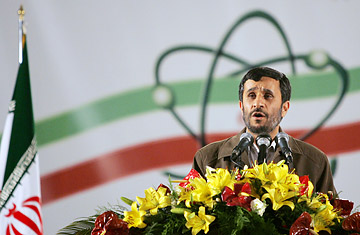
Iranian President Mahmoud Ahmadinejad delivers a speech during a visit to the Natanz uranium enrichment facility some 300 kms south of the capital Tehran.
There was something for everyone in last week's IAEA report on Iran's nuclear program. For the bomb-Iran hawks, there was confirmation that Iran continues to enrich uranium despite the limited sanctions of the U.N. Security Council. For Iran's leaders there was confirmation of their cooperation with nuclear inspectors and of the fact that they have not diverted nuclear material for bomb-making purposes. And for advocates of continued diplomacy there was sufficient evidence of Iranian cooperation, and insufficient evidence of any immediate peril, to justify further negotiations.
So, while the U.S. and its closest allies are pushing this week for the U.N. Security Council to adopt harsher sanctions against Iran, their prospects of winning U.N. agreement for new punitive measures at this stage appear bleak. Key Security Council powers China and Russia, as well as European states such as Germany and Italy that trade extensively with Iran, warn that new sanctions could endanger such cooperation. But for the U.S. and its closest allies, the fact that Iran's uranium-enrichment centrifuges are spinning is an intolerable fact.
Although enriching uranium is permitted under the Non-Proliferation Treaty, Iran's failure to fully disclose all of its past nuclear operations prompted the Security Council to demand a suspension of enrichment until all outstanding concerns can be resolved. What Iran has lately attempted to do is to resolve the IAEA's original complaint without actually turning off its centrifuges. For the U.S. and its allies, however, the key objective is preventing the Iranians from mastering the enrichment know-how that would allow them to produce bomb material. And so the deadlock continues.
For those, including key European and Arab allies, fearful that the stalemate raises the likelihood of military confrontation before President Bush leaves office in January 2008, there was another lifeline — or straw, depending on your perspective — offered by President Mahmoud Ahmadinejad at the weekend. During a visit to Saudi Arabia for an OPEC summit, the usually provocative Iranian President told an interviewer Iran would consider an Arab proposal for offshoring its industrial uranium enrichment in a neutral country such as Switzerland.
Although proposals for Iran to use nuclear fuel enriched outside its borders are not new, Ahmedinajad's response will certainly raise hopes of a new Iranian flexibility. But Iranian officials have previously indicated that Iran would demand that it be allowed to retain the current research-scale enrichment facilities that are at the heart of the dispute. And it's not hard to see why that would be unacceptable to the U.S. "The amount of enrichment capacity you need to feed a nuclear reactor for energy purposes is actually far greater than what you need to make one bomb's worth of nuclear material a year," explains Ivan Oelrich, Vice President for Strategic Security Programs at the Federation of American Scientists. "It's actually not economical for Iran to enrich its own reactor fuel — it would be far cheaper to buy it from the Russians or others." But a research facility running a cascade of 3,000 centrifuges at peak efficiency could potentially produce enough material for one nuclear bomb a year, although Oelrich notes that technical difficulties are believed to be hampering the Iranian program. Skepticism over whether Iran is as advanced as its leaders claim it to be in mastering enrichment technology hampers the case being made by Washington's hawks that a moment of truth has arrived.
The hawks are warning that diplomacy is fruitless, and that the President will be forced before the end of his term to choose between military action and accepting a nuclear-armed Iran. The President's former U.N. ambassador John Bolton is openly complaining that Bush is betraying his own best instincts under the malign influence of "pragmatists" such as Secretary of State Condoleezza Rice.
Yet the outlook of the hawks does not appear to be very widely shared. France, for example, has lately become President Bush's strongest European ally on Iran, but much of what President Nicolas Sarkozy is hearing from his own intelligence services dilutes the sense of urgency — suggesting that Iran is unlikely to cross the threshold to nuclear-weapons capability before 2010 or 2011. Some members of the intelligence community are also warning Sarkozy that the immediate consequences of air strikes on Iran's nuclear facilities would be far more dangerous than Iran's program.
The hawks are clearly pinning their hopes on a belief that President Bush will not be willing to leave office without resolving the Iran nuclear issue. But more pragmatic elements in Europe and the Middle East may be counting on the likelihood that the next U.S. President will be more willing than Bush to hold direct, unconditional talks with Iran in search of a diplomatic solution, as the Europeans have long urged. And later that year, President Ahmadinejad faces a tough reelection battle of his own. All of which means that few will be pushing for a final confrontation over Iran's nuclear ambitions any time soon.
